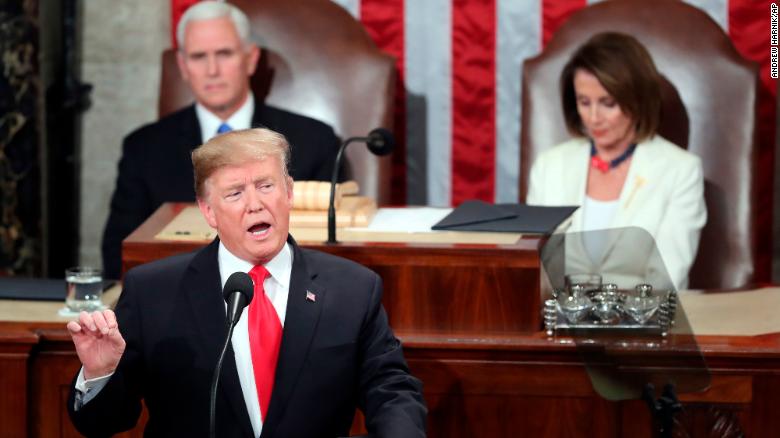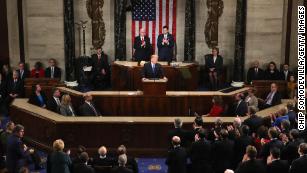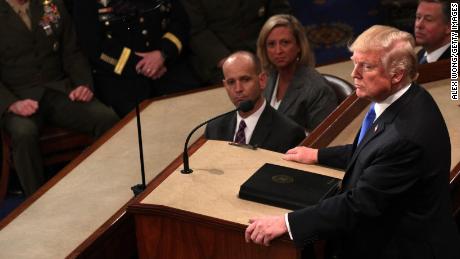Trump calls for rejection of 'politics of revenge' in speech that jabs Democrats
President Donald Trump appeared before a divided Congress for the first time on Tuesday to appeal to lawmakers' sense of unity at a moment of deepening partisan spite.
His calls for conciliation -- which did not address his role in inflaming partisan divisions -- were met with mostly stone-faced silence from Democrats, who bitterly oppose most of his agenda and whose memories are still fresh with the 35-day government shutdown. It was his first time addressing the Democratic-majority House, and his political nemesis, House Speaker Nancy Pelosi, sat behind his shoulder, offering only sparing applause.
"We must reject the politics of revenge, resistance and retribution," Trump told Congress near the beginning of his State of the Union address, claiming he was putting forward "the agenda of the American people."
But the President's address was a tale of two speeches, with appeals to bipartisanship giving way to divisive policy pitches and stern warnings aimed at discouraging Democratic investigations into his administration.
State of the Union promises epic political drama
"An economic miracle is taking place in the United States -- and the only thing that can stop it are foolish wars, politics or ridiculous partisan investigations," the President said to only a smattering of applause. "If there is going to be peace and legislation, there cannot be war and investigation. It just doesn't work that way!"
Democrats have promised they will use new investigative powers to probe everything from Trump's tax returns to his policy decisions to members of his Cabinet. The special counsel Robert Mueller is also still pursuing his investigation stemming from Russian interference in the 2016 election.
"Members of Congress: the state of our union is strong," Trump said to Republican applause and chants of "USA."
"That sounds so good," he said.
Despite the partisan jabs, Trump sought to portray his agenda -- one frequently defined by deeply divisive policies -- as a nonpartisan venture.
Sections on fairer drug pricing, criminal justice revisions and combating HIV/AIDS have been included in a nod to areas that have garnered bipartisan support. Yet immigration -- which has divided Washington -- remained a major focus of the speech.
And aiming for bipartisan applause lines, the President focused in on non-controversial, heart-warming tales: a 10-year-old cancer survivor, a trio of World War II veterans and a SWAT police officer who braved a hail of bullets to stop the shooter at a Pittsburgh synagogue last year.
Ahead of the address, Trump was sniping at Democrats who have already dismissed his calls for unity. Senate Democratic leader Chuck Schumer accused the President of "blatant hypocrisy" in remarks on the Senate floor Tuesday.
"He's just upset that he didn't win the Senate, after spending a fortune, like he thought he would," Trump shot back on Twitter.
The President's track record is also clear: Many of his past attempts at bipartisanship have quickly evaporated amid tweeted barbs.
'I will get it built'
He also made clear he is not wavering on his demand for a $5 billion border wall -- which Democrats have declared a nonstarter -- even as he pulls out rhetorical flourishes envisioning a post-partisan Washington.
After a 35-day government shutdown that resulted in no border wall, Trump vowed to "get it built" during his State of the Union address.
"My administration has sent to Congress a commonsense proposal to end the crisis on our southern border. It includes humanitarian assistance, more law enforcement, drug detection at our ports, closing loopholes that enable child smuggling and plans for a new physical barrier or wall, to secure the vast areas between our ports of entry," he said.
"In the past, most of the people in this room voted for a wall but the proper wall never got built. I will get it built," he added.
Stakes
State of the Union 2019: What to watch
The annual address from the US Capitol is one of the most familiar set pieces of the presidency, and one of the most watched. Trump believes it can lend his arguments credibility at a vulnerable moment, as his poll numbers trend lower and Democratic challengers -- many of whom will be in his audience -- begin to announce their intentions.
Polls show Trump unpopular among most Americans and a monthlong partial government shutdown over securing funds for the wall only damaged him further. But there are no signs he is backing off his demands and he has said he won't hesitate to close the government again if lawmakers cannot send him a long-term funding measure with the wall funding. They have until February 15 to reach an agreement.
It now appears more likely he'll declare a national emergency on the southern border as a way to secure the wall money without congressional approval. Aides debated whether to announce the move during the State of the Union but ultimately decided against it. Last week Senate Majority Leader Mitch McConnell warned Trump during a private meeting that such a move would be unwise.
Asked Tuesday whether Trump will directly address the state of divided government in Washington, White House counselor Kellyanne Conway told reporters that he will call for unity with Democrats -- which "implicitly" addresses that divisiveness.
"He is, in the way that he's calling for bipartisanship and unity," she said. "That implicitly addresses the fact that there's a divided government."
"But that doesn't mean they can't work together," she continued, pointing to bipartisan efforts on criminal justice.
News Courtesy: www.cnn.com













